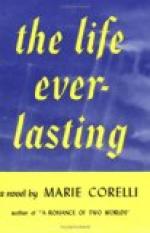“But do you not see that you are shutting yourself out from love?” I said—“You will not have it! You bar its approach. You encourage your sad and morbid fancies, and think of illness when you might just as well think of health. Oh, I know you will say I am ’up in the air’ as your father expresses it,—but it’s true all the same that if you love everything in Nature—yes, everything!—sunshine, air, cloud, rain, trees, birds, blossom,—they will love you in return and give you some of their life and strength and beauty.”
She smiled,—a very bitter little smile.
“You talk like a poet,”—she said—“And of all things in the world I hate poetry! There!—don’t think me cross! Go along and be happy in your own strange fanciful way! I cannot be other than I am,—Dr. Brayle will tell you that I’m not strong enough to share in other people’s lives and aims and pleasures,—I must always consider myself.”
“Dr. Brayle tells you that?” I queried—“To consider yourself?”
“Of course he does. If I had not considered myself every hour and every day, I should have been dead long ago. I have to consider everything I eat and drink lest it should make me ill.”
I rose from my seat beside her.
“I wish I could cure you!” I murmured.
“My dear girl, if you could, you would, I am sure,”—she answered— “You are very kind-hearted. It has done me good to talk to you and tell you all my sad little history. I shall get up presently and have my electricity and feel quite bright for a time. But as for a cure, you might as well try to cure my father.”
“None are cured of any ailment unless they resolve to help along the cure themselves,” I said.
She gave a weary little laugh.
“Ah, that’s one of your pet theories, but it’s no use to me! I’m past all helping of myself, so you may give me up as a bad job!”
“But you asked me,” I went on—“did you not, to tell you why it is that I am contented and happy? Do you really want to know?”
A vague distrust crept into her faded eyes.
“Not if it’s a theory!” she said—“I should not have the brain or the patience to think it out.”
I laughed.
“It’s not a theory, it’s a truth”—I answered—“But truth is sometimes more difficult than theory.”
She looked at me half in wonder, half in appeal.
“Well, what is it?”
“Just this”—and I knelt beside her for a moment holding her hand— “I know that there are no external surroundings which we do not make for ourselves, and that our troubles are born of our own wrong thinking, and are not sent from God. I train my Soul to be calm,— and my body obeys my Soul. That’s all!”
Her fingers closed on mine nervously.
“But what’s the use of telling me this?” she half whispered—“I don’t believe in God or the Soul!”
I rose from my kneeling attitude.




